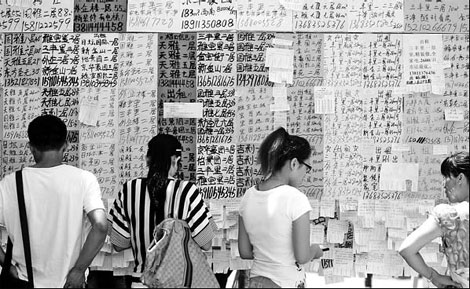Foreigners hit by rising property market
 |
|
People read rental listings in Beijing. Residents from overseas are also feeling the pressure from rising rental costs. |
The heating system broke down in Jason Klug's apartment a week ago, but the landlord said if Klug wanted heating, he would have to fix it himself.
"It seems like a lot of things break in this apartment," said Klug, 23, a student from the United States.
Klug lives in a 120-square-meter apartment in Beijing's Dongcheng district, near the landmark Temple of Heaven, where Chinese emperors once prayed.
It is a slab-type apartment built in the 1950s. Klug, who is studying Chinese at Tsinghua University, shares the 5,500-yuan ($837) monthly rental with three friends.
"Finding a good apartment in Beijing for a reasonable price is getting harder," Klug said.
Klug is not alone. With the soaring real estate market, more foreigners in China are facing the pressures of renting.
Statistics from the Beijing Housing and Urban-Rural Development Commission show that in the first half of February, the average rental in Beijing reached 2,965 yuan a month, a rise of 13.7 percent year-on-year.
Recently the municipal government unveiled stricter policies by prohibiting people from buying homes if they lack Beijing household registration, or proof of either social security contributions or income tax payments in the capital for five consecutive years.
The move, many analysts said, will boost rentals in the Chinese capital.
A survey by SouFunHoldings Ltd, a real estate Internet portal in Beijing, showed that 51.1 percent of those disqualified from buying a home in the capital would turn to renting.
Kong Dan, an agent with 5i5j Real Estate Service,said the policy, aimed at curbing speculation, would increase rental demand and inflate prices.
"In 2011, rentals in Beijing are expected to grow by 12 percent and will continue to increase in the coming five years," Kong said.
Surging rentals and a sellers' market have put pressure not only on locals, but also foreigners, especially students and new employees without a comfortable income.
"Housing presents a dilemma for foreigners now because prices are rising and our incomes are falling," said Klug.
He's planning to find a job in China, but he feels that living in big cities in China is now more difficult.
Klug estimates he would earn 6,000 yuan a month at most at his first job. "If you count in the cost of living, it would be difficult for me to pay a monthly rent of more than 2,000 yuan," he said.
At present, he pays 1,400 yuan a month but if that figure ever exceeds 2,000 yuan, he will consider moving, perhaps to a lower quality place.
"It might be less nice or convenient," he said. "Rising rents have made us less comfortable."
Charles Henderson, 23, a PR professional in Guangzhou. lives in the central part of the city. Saving money is his main priority.
"If the rent is between one-third and half (of my salary), and, adding in other expenses, my savings from the job would be minimal," he said.
He said if rents keep rising, he will move from the city center, or switch to a two-bedroom apartment where he could split the cost with someone.
However, the situation is better for expatriates whose stay in China is short.
Chen Chonglin, a rental adviser with Rentnet Real Estate, which specializes in the expatriate market, said foreign businessmen who come for periods ranging from one month to two years have no problems because their companies will pay the rent.
But for some foreigners with families here and who plan to stay for a couple of years, increasing rents could be a problem.
"The one thing that makes living in Beijing expensive is housing," said Bamdad Jabbari, 39, a program manager with a high-technology company.
 0
0 






